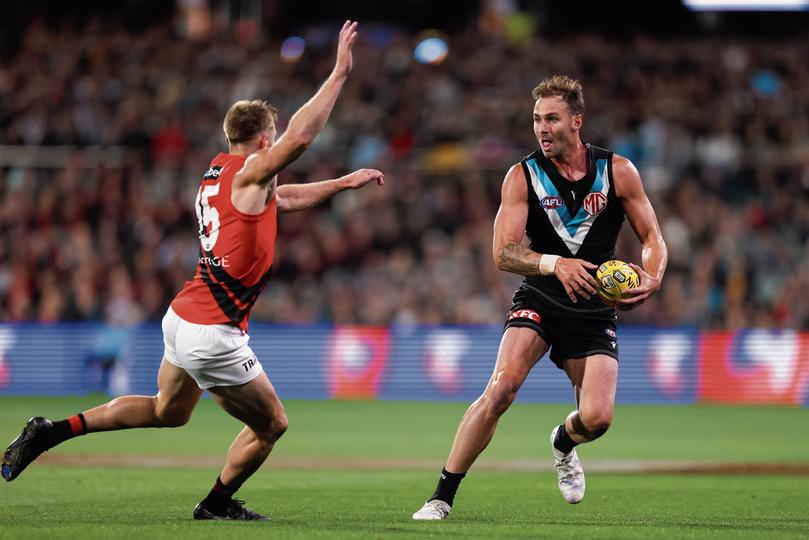GEORGIE PARKER: Players such as Christian Petracca, Jeremy Cameron, Mason Cox Sam Draper deserve to be heard
The good, the bad and the teary from AFL players’ social media.

Athletes are capitalising on their brand off the field as much as on.
Be it Christian Petracca with his TikTok cooking channel or Jeremy Cameron with his farm YouTube vlogs, which I recommend watching as he’s a ripper farmer.
Players are discovering they can make money from their own brand, and they can create the narrative they want from what they say on their own channels. As a result, clubs and the AFL are anxious.
Sign up to The Nightly's newsletters.
Get the first look at the digital newspaper, curated daily stories and breaking headlines delivered to your inbox.
By continuing you agree to our Terms and Privacy Policy.The content is enthusiastically consumed by fans keen to get as much insight into their favourite stars’ lives as possible.
The productions give players their own space to be able to showcase their personalities - which we are craving to see - as well as seeing them not just as athletes on the pitch, but people who have interests and opinions on their clubs, the AFL and, of course, their sponsors.
While I can understand the clubs’ concerns, these podcasts and social media platforms show where players stand on social and moral issues, on and off-field league issues and simply what they find interesting or funny.
My take on this player content is, if you don’t want people talking poorly of you, don’t act poorly. That’s accountability for the league, clubs and coaches.
If a player talks out of school, then they have to own it and can’t shift the blame to anyone else as they don’t have a PR team to catch their mistakes. That’s accountability for the players themselves.
The content can be “real”, vulnerable and interesting - ideally all three at once. Anyone wanting to curtail this is just being a wet blanket and needs to trust the players.
Here’s a few examples of the good, bad and indifferent podcast content.
The 200 PLUS podcast has given us a couple of gems. Not only will you hear Nick Larkey giving an outstanding impersonation of AFL reporter Damien Barrett, you’ll have also heard Essendon’s Sam Draper cause chaos by implying that a few Western Bulldogs players will request trades if coach Luke Beveridge stays on. It got the ruckman in strife and resulted in a public tongue-lashing from his coach Brad Scott.
“Disappointed and disrespectful” is how Scott described Draper’s barbs.
Maybe it got Scott worried that players from other clubs may say the same about him or his team? To me it looks like a player looking out for player and a coach looking out for coach. Play on, I say.
This is the stuff I want to see, players showing their personalities and sharing their take on the juicy and interesting stuff.
Another example where clubs and the AFL weren’t happy with a player’s podcast was Port Adelaide’s Jeremy Finlayson. He was given a three-week suspension from the AFL for his homophobic slur during Gather Round.
This was followed by a tearful and, what seemed remorseful, response from him that he wanted to be a better person.
That was until a week later when, on his wife’s podcast, he was caught laughing and saying he was “p...ed off” about the suspension.
Maybe he was not so remorseful without a club publicist helping him.
Port Adelaide have every right to be frustrated, first with the slur, then the apology seemingly being delivered with crocodile tears.

As a fan, it lifted the wool that was being pulled over our eyes, and for players, it was a timely reminder that you should think before you speak.
A type of podcast clubs would feel more comfortable their players imitate would be Mason Cox’s. A nice safe zone for all involved.
He was issued a please explain by the AFL in round one after running into Greater Western Sydney ruck coach Shane Mumford during the warm-up.
We don’t know what when on behind closed doors so fans started making up their own ideas on how it should have been handled. Cox explained himself on his podcast.
No mess, no fuss, straight from the horse’s month on what happened and why. Love him or hate him, Cox knows how to market himself with his personality, and he has a cult following because of it.
Clubs and the AFL try are always trying to control the narrative around players and what they say. Thee clubs are worried and anxious about things getting out of their control.
They want players to have a voice and say the fun things, but on their terms and carefully vetted by a team of spin doctors before being released for public consumption.
But give players a go and, dare I say it, trust the kids. They have more riding on it than the clubs and the AFL does, but we as fans have a lot to gain because of it.
